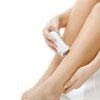 usa.netflixcehennemi.top
usa.netflixcehennemi.top 
Any way of epilation gives our skin "inconvenience". The epilator or razor injures the upper layer of the skin, so with improper care it can lead to inflammation, irritation, ingrown hairs , pigmentation and other unpleasant consequences. Avoiding skin problems after epilation is possible by following the following tips.
Inflammation of the skin after epilation is caused by bacteria. Your task is to neutralize and calm your skin.
Many women should use a normal men's cream or a shaving lotion for sensitive skin after epilation. Perfectly soothes the skin and baby cream. Some women use baby powder or talc after epilation, however dermatologists do not recommend doing this, since powder covers the pores of the skin and can cause inflammation.
To prevent strong irritation after shaving, use a very sharp razor. Blunt blade greatly injures the skin.
The least irritation occurs after hair removal with wax and sugar (shugaring).
If immediately after epilation you feel a burning sensation on the skin, noticed redness, micro trauma, it should immediately be disinfected. For this purpose, 70% alcohol, a solution of hydrogen peroxide, as well as an alcohol tincture of calendula, propolis or chamomile are suitable. This will narrow the pores and destroy the bacteria. Alcohol-containing solutions should not get on the mucous membrane. After treatment, apply a moisturizing cream.
Instead of alcohol, you can wipe the skin with antiseptic tincture Miromistin, Chloresedin or Furatsilina or thermal water. This is a more gentle and painless variant of disinfection.
If irritation has already appeared, it is effectively treated with antiseptic ointments such as solcoseryl, malavit, actovegin, boron plus, miramistin, etc.
One of the best agents for the treatment of skin inflammation are ointments based on Panthenol. They quickly remove irritation, remove microbes and restore the structure of the skin.
1. An excellent medicine for the skin are broths from herbs chamomile, calendula, celandine. Do lotions of herbs on inflamed skin several times a day.
2. Essential oil of eucalyptus and tea tree. Dilute 2-3 drops of oil in a tablespoon of any vegetable oil and lubricate the skin.
3. Fresh aloe juice will quickly relieve inflammation and moisturize the skin. Cut the washed fresh aloe leaf along and attach to the sore spot.
After epilation, your skin is vulnerable and needs special protection. During the day after epilation, do not apply deodorants, perfumes and other cosmetics with fruit acids to the skin to avoid irritation.
It is recommended several times a day to lubricate the skin with special means to slow down hair growth and soften the skin.
After epilation, do not sunbathe for 48 hours in the sun or in the solarium, otherwise you can "earn" pigmentation of the skin or inflammation.
After waxing:
If after waxing you notice the wax residues on the skin, they can be easily removed with any cosmetic oil (olive oil is also suitable). Then it is recommended to apply on the skin means, slowing down hair growth.
After waxing, irritation occurs rarely, so if you develop a rash, there is a strong possibility that it is an allergy. You will be helped by antihistamines, for example, Tavegil. If the rash does not pass, it is better to consult an allergist.
After waxing, it is not recommended to visit the sauna or sauna for 24 hours.
After laser hair removal:
If you have sensitive skin, after the procedure of laser hair removal can appear redness and soreness of the skin, which lasts up to several hours. Soothe skin in this case will help a special softening spray or cream with extracts of herbs.
Remember that after laser hair removal it is extremely undesirable to sunbathe for 7-10 days. There is a big risk of the appearance of age spots.
Open areas of the body after laser hair removal should be lubricated with sunscreen to protect against ultraviolet radiation.